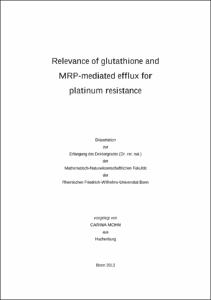Mohn, Carina: Relevance of glutathione and MRP-mediated efflux for platinum resistance. - Bonn, 2013. - Dissertation, Rheinische Friedrich-Wilhelms-Universität Bonn.
Online-Ausgabe in bonndoc: https://nbn-resolving.org/urn:nbn:de:hbz:5n-33158
Online-Ausgabe in bonndoc: https://nbn-resolving.org/urn:nbn:de:hbz:5n-33158
@phdthesis{handle:20.500.11811/5742,
urn: https://nbn-resolving.org/urn:nbn:de:hbz:5n-33158,
author = {{Carina Mohn}},
title = {Relevance of glutathione and MRP-mediated efflux for platinum resistance},
school = {Rheinische Friedrich-Wilhelms-Universität Bonn},
year = 2013,
month = sep,
note = {Therapeutic resistance towards platinum complexes is a multicausal interaction of diverse mechanisms. This project aimed to reveal the role of GSH and MRP-mediated efflux. Elevated GSH content, formation of platinum-GSH adducts and their efflux via MRP2 has been suggested to be associated with platinum resistance in many cases. In this project the impact of GSH and MRP-mediated efflux was investigated in two human cancer cell lines and their cisplatin- or oxaliplatin-resistant variant. The experiments focused on the platinum complex oxaliplatin as there is only limited research on the contribution of GSH and MRP mediated efflux to oxaliplatin resistance so far.
The results of this project indicate that GSH is associated with oxaliplatin cytotoxicity but not with oxaliplatin resistance. Depletion of GSH resulted in an increase of sensitivity towards oxaliplatin but did not affect platinum accumulation in human tumor cells. However, GSH depletion did not overcome oxaliplatin resistance and also incubating cells with oxaliplatin did not result in alterations of GSH content. ESI-MS was applied as a method for detection and structural analysis of platinum GSH adducts. Furthermore, chemical structures of one oxaliplatin-GSH and two cisplatin-GSH adducts could be identified. The formation of intracellular platinum-GSH adducts is probable but still has to be confirmed in human cancer cells.
Platinum accumulation was found to be increased after combined incubation of oxaliplatin or cisplatin with MRP modulators in cells expressing detectable levels of MRP2. Thus an efflux of cisplatin and oxaliplatin via MRP in the cells investigated is likely. But as GSH depletion did not affect platinum accumulation, the efflux does not seem to depend on GSH. In the case of oxaliplatin, DNA platination was also assessed and augmented accumulation was associated with an increase of platinated DNA. Despite these findings, MRP modulator co incubation did not result in sensitization towards oxaliplatin and hence a direct association of MRP-mediated efflux and platinum resistance could not be shown. Moreover, oxaliplatin itself did not modulate MRP1- and/or MRP2-mediated efflux.
In summary, this project contributes to the knowledge of the relevance of GSH and MRP mediated efflux in platinum resistance. Based on the results cellular GSH content is associated with oxaliplatin cytotoxicity but not with oxaliplatin resistance. Results also suggest that oxaliplatin as well as cisplatin are likely to be transported by MRP1 and/or MRP2. However, MRP-mediated efflux does not seem to play a role in oxaliplatin resistance.},
url = {https://hdl.handle.net/20.500.11811/5742}
}
urn: https://nbn-resolving.org/urn:nbn:de:hbz:5n-33158,
author = {{Carina Mohn}},
title = {Relevance of glutathione and MRP-mediated efflux for platinum resistance},
school = {Rheinische Friedrich-Wilhelms-Universität Bonn},
year = 2013,
month = sep,
note = {Therapeutic resistance towards platinum complexes is a multicausal interaction of diverse mechanisms. This project aimed to reveal the role of GSH and MRP-mediated efflux. Elevated GSH content, formation of platinum-GSH adducts and their efflux via MRP2 has been suggested to be associated with platinum resistance in many cases. In this project the impact of GSH and MRP-mediated efflux was investigated in two human cancer cell lines and their cisplatin- or oxaliplatin-resistant variant. The experiments focused on the platinum complex oxaliplatin as there is only limited research on the contribution of GSH and MRP mediated efflux to oxaliplatin resistance so far.
The results of this project indicate that GSH is associated with oxaliplatin cytotoxicity but not with oxaliplatin resistance. Depletion of GSH resulted in an increase of sensitivity towards oxaliplatin but did not affect platinum accumulation in human tumor cells. However, GSH depletion did not overcome oxaliplatin resistance and also incubating cells with oxaliplatin did not result in alterations of GSH content. ESI-MS was applied as a method for detection and structural analysis of platinum GSH adducts. Furthermore, chemical structures of one oxaliplatin-GSH and two cisplatin-GSH adducts could be identified. The formation of intracellular platinum-GSH adducts is probable but still has to be confirmed in human cancer cells.
Platinum accumulation was found to be increased after combined incubation of oxaliplatin or cisplatin with MRP modulators in cells expressing detectable levels of MRP2. Thus an efflux of cisplatin and oxaliplatin via MRP in the cells investigated is likely. But as GSH depletion did not affect platinum accumulation, the efflux does not seem to depend on GSH. In the case of oxaliplatin, DNA platination was also assessed and augmented accumulation was associated with an increase of platinated DNA. Despite these findings, MRP modulator co incubation did not result in sensitization towards oxaliplatin and hence a direct association of MRP-mediated efflux and platinum resistance could not be shown. Moreover, oxaliplatin itself did not modulate MRP1- and/or MRP2-mediated efflux.
In summary, this project contributes to the knowledge of the relevance of GSH and MRP mediated efflux in platinum resistance. Based on the results cellular GSH content is associated with oxaliplatin cytotoxicity but not with oxaliplatin resistance. Results also suggest that oxaliplatin as well as cisplatin are likely to be transported by MRP1 and/or MRP2. However, MRP-mediated efflux does not seem to play a role in oxaliplatin resistance.},
url = {https://hdl.handle.net/20.500.11811/5742}
}






